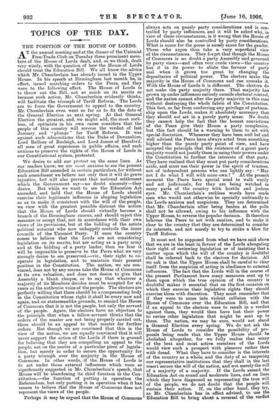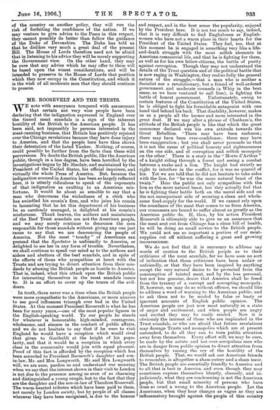TOPICS OF THE DAY.
THE POSITION OF THE HOUSE OF LORDS.
AT the annual meeting and at the dinner of the Unionist Free-Trade Club on Tuesday three prominent mem- bers of the House of Lords dealt, and, as we think, dealt very wisely, with the question of how the House of Lords should treat the Education Bill. We all know the advice which Mr. Chamberlain has already issued to the Upper House. In his speech at Birmingham last month he, in effect, issued marching orders to the Peers, and they were to the following effect. The House of Lords is to throw out the Bill, not so much on its merits as because such action, Mr. Chamberlain evidently thinks, will facilitate the triumph of Tariff Reform. The Lords are to force the Government to appeal to the country. Mr. Chamberlain even went so far as to fix the date of the General Election as next spring. At that General Election the greatest, and, we might add, the most reck- less, of optimists in his own cause considers that the people of this country will reverse the verdict of last January and " plunge " for Tariff Reform. It was against such admonitions that the Duke of Devonshire, Lord Balfour of Burleigh, and Lord James of Hereford, all men of great experience in public affairs, and each anxious to preserve the rights of the House of Lords in our Constitutional system, protested.
We desire to add our protest on the same lines. As our readers know, we are most anxious to see the present Education Bill amended in certain particulars, for without such amendment we believe not only that it will do grave injustice, but will also prevent that national settlement which the Government say—no doubt sincerely—they desire. But while we want to see the Education Act amended, and hold that the House of Lords should exercise their legitimate influence in shaping legislation so as to make it consistent with the will of the people, we view with the greatest possible distrust the notion that the House of Lords should virtually become a branch of the Birmingham caucus, and should reject this measure or accept that, not in accordance with their own views of its provisions, but at the bidding of the astute political autocrat who now unhappily controls the inner councils of the Unionist Party. If once the country comes to believe that the Lords are not considering legislation on its merits, but are acting as a party army and at the bidding of a party leader, then we fear it will be impossible to preserve to the Peers what. we very strongly desire to see preserved,—viz., their right to co- operate in legislation, and to maintain their present position in the Constitution. The nation, we are con- vinced, does not by any means take the House of Commons at its own valuation, and does not desire to give that • Assembly a blank cheque, or to say that whatever a majority of its Members decides must be accepted for six years as the authentic voice of the people. The electors are perfectly willing that there should be a compensating body in the Constitution whose right it shall be every now and again, and on statesmanlike grounds, to remind the House of Commons that it is not the people, but only the servant of the people. Again, the electors have no objection to the principle that when a fellow-servant thinks that the orders of the master are not being properly carried out, there should be an appeal to that master for further orders. But though we are convinced that this is the view of the nation, we are equally convinced that it will never support the action of the Lords if there is ground for believing that they are compelling an appeal to the people, not on the merits of a particular piece of legisla- tion, but merely in order to secure the opportunity for a party triumph over the majority in the House of Commons. In other words, if the House of Lords is to act under those external influences which were so significantly suggested in Mr. Chamberlain's speech, that House will be abandoning its chief function in the Con- stitution,—the function of putting in operation the Referendum, but only putting it in operation when it has reason to believe that the House of Commons does not represent the views of the people.
Perhaps it may be argued that the House of Commons always acts on purely party considerations and is con- trolled by party influences, and it will be asked why, in view of these circumstances, is it wrong that the House of Lords should also be controlled by party considerations. What is sauce for the goose is surely sauce for the gander. Those who argue thus take a very superficial 'view of the circumstances. They forget that though the Muse of Commons is no doubt a party Assembly and governed by party views—and often very crude views—the country has it in its power to abate the fervour of party zeal when it grows too great by changing the depositaries of political power. The electors make the majority in the House of Commons and can unmake it. With the House of Lords it is different. The electors do not make the party majority there. That majority has grown up under influences entirely outside electoral control, and the nation cannot alter the party majority in this case without destroying the whole fabric of the Constitution. This fact, so far from conferring any privilege of partisan- ship upon the Lords, makes it absolutely necessary that they should not act in a purely party sense. No doubt they cannot help the fact that the honest convictions of the Peers give their House a party complexion, but this fact should be a warning to them to act with special discretion. Whenever they have been well led and well advised the Peers have always acted from something higher than the purely party point of view, and have accepted the principle that the existence of a great party majority would not justify them in using their powers under the Constitution to further the interests of that party. They have realised that they must put party considerations aside, and must use their power in the spirit of trustees, not of independent persons who can lightly say : " May not I do what I will with mine own ? At the present moment the Peers have special need to walk warily and act judiciously, for they are being watched in many parts of the country with hostile and jealous eyes. Mr. Chamberlain's reckless words have made men who would not otherwise be specially unfriendly to the Lords anxious and suspicious. They are determined that Mr. Chamberlain after being beaten at the polls shall not be allowed, owing to his influence with the Upper House, to reverse the popular decision. It therefore behoves the Peers to act with caution, and to make it clear to the country that they are determined to consider its interests, and not merely to try to strike a blow for Tariff Reform.
It must not be supposed from what we have said above that we are in the least in favour of the Lords abrogating their right of reviewing legislation or of insisting that a matter upon which the will of the country is doubtful shall be referred back to the electors for decision. All we ask is that the Upper House shall be careful to clear itself from the suspicion of acting in obedience to external influences. The fact that the Lords will in the course of the present Parliament have many measures sent up to them upon which the true opinion of the country is doubtful makes it essential that on the first occasion on which they exercise their legislative rights they • should exercise them with discretion. They must remember that if they were to come into violent collision with the House of Commons over the Education Bill, and that if an appeal to the electors were to result in a verdict against them, they would then have lost their power to revise other legislation that might be sent up to them. The nation, we may be sure, would not stand a General Election every spring. We do not ask the House of Lords to consider the possibility of pro- posals being made that the Upper House should be abolished altogether, for we fully realise that many of the best and most active members of the Lords would view such a prospect with pleasure rather than with dread. What they have to consider is the interests of the country as a whole, and the duty of so tempering our representative institutions that they shall in the last resort secure the will of the nation, and not merely the will of a majority of a majority. If the Lords amend the Education Act on sound and moderate lines, and on lines which they have diagnosed as representing the true will of the people, we do not doubt that the people will sustain their action. If, on the other band, they try, as Mr. Chamberlain has in effect advised, to use the Education Bill to bring' about a reversal of the verdict of the country on another policy, they will run the risk of forfeiting the confidence of the nation. If we may venture to give advice to the Peers in this respect, thercannot possibly do better than follow the guidance of the Duke of Devonshire. The Duke has told us that he dislikes very much a great deal of the present Bill. The House of Lords therefore need not be afraid that in listening to his advice they will be merely supporting the Government view. On the other hand, they may be sure that any advice which he may offer to them will be based upon the wisest considerations, and will be intended to preserve to the House of Lords that position which they now occupy in the Constitution, and which it is the wish 'of all moderate men that they should continue to possess.











































 Previous page
Previous page